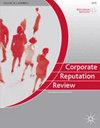“顶级专家”悖论与声誉启发式
IF 1.6
Q3 BUSINESS
引用次数: 0
摘要
这一章对人们对专家的信任进行了批判性的分析。它呈现出许多偏见,影响和扭曲了人们对他人声誉的看法。它还考察了影响人们感知的启发式,并引导他们准确或不准确地对社会网络中的人或物进行分类。声誉永远不会被视为理所当然,它总是会带来不确定性和焦虑。这是因为社会地位永远是不稳定的,永远不能客观确定。本章还对声誉的“好”与“坏”用途进行了区分,以形成正确的声誉认识论。我们的目标是确定一套规范性和描述性的工具,这些工具可以用来对启发式进行分类,并建立某种标准,沿着经典认识论传统的路线,以区分对他人声誉信任过多或过少的推理规则。本文章由计算机程序翻译,如有差异,请以英文原文为准。
The Paradox of the “Top Specialist” and the Heuristics of Reputation
This chapter contains a critical analysis of people's faith in experts. It presents many biases that influence and distort people's perception of the reputation of others. It also examines the heuristics that influence people's perceptions and lead them to classify accurately or inaccurately a person or object within a social network. Reputation can never be taken for granted and always creates uncertainty and anxiety. This is because social position is always precarious and can never be objectively determined. The chapter also distinguishes the “good” from the “bad” uses of reputation in order to develop a proper epistemology of reputation. The objective is to identify a set of normative and descriptive instruments that can be used to classify the heuristics and establish some sort of criteria, along the lines of the classical epistemological tradition in order to distinguish between the rules of inference that place too much or too little trust in the reputations of others.
求助全文
通过发布文献求助,成功后即可免费获取论文全文。
去求助
来源期刊
CiteScore
3.80
自引率
5.30%
发文量
19
期刊介绍:
Corporate Reputation Review is the leading international journal for all scholars and academics concerned with managing and measuring corporate reputation.The Journal is reviewed by a distinguished editorial board, under the guidance of Guido Berens (Erasmus University, The Netherlands). Corporate Reputation Review provides a forum for rigorous, practically relevant academic research into reputations and reputation management, as well as related concepts such as identity and corporate communication.

 求助内容:
求助内容: 应助结果提醒方式:
应助结果提醒方式:


